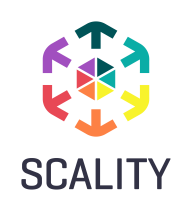


Scality RING and Nutanix Unified Storage (NUS) are competing storage solutions with Scality RING known for cost-effectiveness and customer support, while NUS offers advanced features appealing enough to justify its pricing.
Features:Scality RING provides data durability, multi-cloud capabilities, and seamless integration across various environments. Nutanix Unified Storage excels in scalability, advanced analytics for operational insights, and easy management through a unified interface.
Room for Improvement:Scality RING could enhance its feature set to better compete with advanced offerings. Improvements in scalability options and analytics could be beneficial. Nutanix Unified Storage could offer more cost-effective solutions for budget-conscious enterprises and reduce the complexity of its advanced features for easier adoption.
Ease of Deployment and Customer Service:Scality RING is praised for easy deployment and strong customer support. Nutanix Unified Storage facilitates efficient deployment and provides tailored services and resources for customized solutions, enhancing its personalized support experience.
Pricing and ROI:Scality RING has a lower initial setup cost, appealing for budget-focused businesses, translating into a favorable ROI. Nutanix Unified Storage, despite higher initial costs, offers long-term value with significant feature offerings and productivity enhancements.
It does not require much management once you set up correctly, so it saves time, allowing an admin to focus on other work.
For me, the biggest return on investment when using this solution is that we do not have to have much support staff to run it.
The scalability challenge with previous systems is lessened with Nutanix since we can expand by adding new hardware without needing migrations.
We are saving approximately 20% to 25% compared with the competition.
I think RING's ability to maintain predictable costs while providing scalable storage solutions impacts our budget by allowing us to pay only for capacity.
For instance, while the cost per gig on a block storage platform may be $2, it's $1.50 for NAS, and only $0.50 for object storage, leading to a remarkable 75% reduction in costs by utilizing the Scality platform.
Scality RING has reduced our operating costs.
I would rate them an eight out of ten.
The support is done through email and is not that great, making it a very problematic area I've been dealing with for over four years.
Their technical support has been perfect lately, so I would give it a 10.
They come on the call, start troubleshooting immediately, and resolve issues effectively.
They are very knowledgeable, and if they can't solve the problem, they find the answer within a day or so.
I would give the customer service and technical support a ten out of ten.
I've always received responses within the required timeframe, the answers were technically relevant, and there was follow-up—people called us back to check if everything was okay and if the ticket could be closed.
Individuals such as Peter Mikolastik really make a difference by saying, 'Come on, what is the problem? I will help you,' rather than just brushing things off.
Technically, when we have major issues in P1, they are very responsive and we can't say that we don't get a response.
Pure Storage FlashBlade is scalable.
There are between 5 and 10,000 people using it in our organization.
This means you don't have to buy everything upfront; you can buy what you need and add more as you grow, which is advantageous.
These three components utilize scalability tools, enabling storage addition to nodes and supporting independent, linear performance growth.
I find the scalability of Nutanix Unified Storage (NUS) to be excellent, and I would rate it a ten based on my clients' requirements.
Upwards, I think, almost unlimited by what we can imagine.
I've never had issues with scalability.
We are relatively well informed about their new features, what will be implemented in future versions, and the scalability of the solution.
In case there is any issue with any blade, the data is moved to another.
We have not experienced these issues with Nutanix, which I attribute to the all-flash technology, the quality of their platform, and the responsiveness of the hyper-converged infrastructure.
Nutanix Unified Storage (NUS) is very stable.
It automatically triggers tasks, causing performance issues.
It is a platform that is very stable at the customer level and does not generate incidents or blockages that you might encounter with standard storage solutions, where you can lose data.
I find that Scality RING is very stable because it allows for many maintenance operations without service loss.
There are factors that can cause Scality RING to become occasionally unavailable, but due to the system's resilience, it is capable of recovering or degrading gracefully.
Technical support definitely needs significant improvement.
Its configuration should be easier.
One way Pure Storage FlashBlade can be improved is by having more compatibility between the FlashArray and FlashBlade.
The main concern is pricing, which could deter some customers; addressing this would enhance its appeal.
The system should move towards AI-driven optimization and enhance S3 object storage capabilities.
System downtime can disturb the entire ecosystem and impact all applications.
Encryption and data security need improvement. We don't have a solution for customers who need confidentiality.
They should prioritize quality over timeliness to minimize customer disruptions and not force customers into a cycle of fixes that interfere with daily work.
What we are currently missing and will be demanding in the new tender is an additional external backup of all data, ideally on a simple system, to safeguard against any severe local incidents so that we still have the data protected elsewhere.
The pricing of Pure Storage FlashBlade is expensive compared to other products I used from other companies in the past, but one benefit is that they have built-in ransomware protection.
Regarding pricing, it is okay; we needed exactly this in size, and the price was a lot lower than competitors, making it good for us.
Compared to buying three or four vendor solutions, it is much cheaper.
The cost has doubled for the same amount of data, which was a challenge when presenting use case justifications for the increased cost.
Nutanix Unified Storage (NUS) has definitely helped reduce our total cost of ownership.
Fortunately, in terms of the license, we are able to expand the disks without having to adjust the license.
In the end, it always depends on how much you pay for it.
Regarding setup costs and licensing, our initial experience is somewhat dated now as we made a comprehensive purchase, including hardware, software, and system setup, which Scality handled at the time.
We can plug in many blades, and we can have data up to one terabyte.
The best features of Pure Storage FlashBlade include better throughput and better performance.
Pure Storage FlashBlade's scalability is one of the most valuable features, and importantly, it always works, allowing for seamless upgrades.
Nutanix Unified Storage (NUS) is appreciated for its fault tolerance and redundancy at the cluster level, which ensures reliable storage of files, folders, and other information accessible on the client side.
The cybersecurity features of Nutanix Unified Storage (NUS) when dealing with unstructured data, such as ransomware threats, provide the ability to detect and back up block-based storage, allowing me to restore repositories or sets of block storage with one button click, which is automatic.
My experience with using Nutanix Unified Storage (NUS) for data-intensive workloads is that we have many SQL Servers and they perform much better than they did when we used hybrid converged previously.
When a server is lost, the data is still accessible.
It is even better stored when there is only one copy on a system and there is a second copy on an immutability system, which is almost equivalent to backing it up on tape and taking it offline, making it completely inaccessible.
Scality RING has influenced our approach to scaling in different dimensions by providing a cost-effective solution for the tremendous amount of data we generate every day for each customer.
| Product | Market Share (%) |
|---|---|
| Nutanix Unified Storage (NUS) | 4.4% |
| Scality RING | 3.9% |
| Pure Storage FlashBlade | 3.5% |
| Other | 88.2% |



| Company Size | Count |
|---|---|
| Small Business | 11 |
| Midsize Enterprise | 11 |
| Large Enterprise | 21 |
| Company Size | Count |
|---|---|
| Small Business | 27 |
| Midsize Enterprise | 30 |
| Large Enterprise | 63 |
| Company Size | Count |
|---|---|
| Small Business | 3 |
| Midsize Enterprise | 1 |
| Large Enterprise | 12 |
FlashBlade is the industry’s most advanced scale-out storage for unstructured data, powered by a modern, massively parallel architecture to consolidate complex data silos (like backup appliances and data lakes) and accelerate tomorrow’s discoveries and insights.
Nutanix Unified Storage offers seamless scalability and high availability with a user-friendly interface, supporting multi-protocol operations while integrating effortlessly with cloud platforms. It enhances performance and security with features like ransomware protection and advanced data management.
Nutanix Unified Storage streamlines storage management by consolidating infrastructure and optimizing virtualization. It reduces operational complexity and enhances performance across diverse workloads. Despite feedback on integration challenges and suggestions for improving pricing, API capabilities, and security, it remains a key choice for dependable storage solutions. Calls for streamlined implementation and enhanced AI capabilities reflect its potential to better support evolving organizational strategies, driving cost efficiency and data accessibility.
What are the key features of Nutanix Unified Storage?In industries, Nutanix Unified Storage is deployed to centralize storage needs, improve database efficiency, and enhance file sharing and security. Organizations use it to consolidate infrastructure, support virtualization, optimize costs, and facilitate virtual machine hosting. It's instrumental in scalable object storage, ransomware protection, integrating legacy systems, and catering to critical applications.
Scality RING is the scalable and resilient object storage solution designed for modern workloads, providing seamless data protection against evolving cyber threats.
Scality RING leverages S3 object storage to meet unpredictable demands with a patented MultiScale Architecture that offers limitless scalability across capacity, performance, and more. It delivers end-to-end cyber resilience with CORE5 for ransomware protection, while its cloud-style economics and intuitive management empower enterprises to accelerate AI initiatives and optimize cloud deployments. Its flexibility is ideal for service providers managing extensive data needs.
What are the key features of Scality RING?Scality RING is extensively implemented in backup solutions across industries, supporting platforms like Veeam and CommVault. It aids in storage expansion and management of large data volumes alongside multi-site architectures. While not leading in AI spaces due to performance constraints, there's potential with faster disk support. It's also used in archives, binary lakes, multimedia services, and AI data lakes.
We monitor all Software Defined Storage (SDS) reviews to prevent fraudulent reviews and keep review quality high. We do not post reviews by company employees or direct competitors. We validate each review for authenticity via cross-reference with LinkedIn, and personal follow-up with the reviewer when necessary.